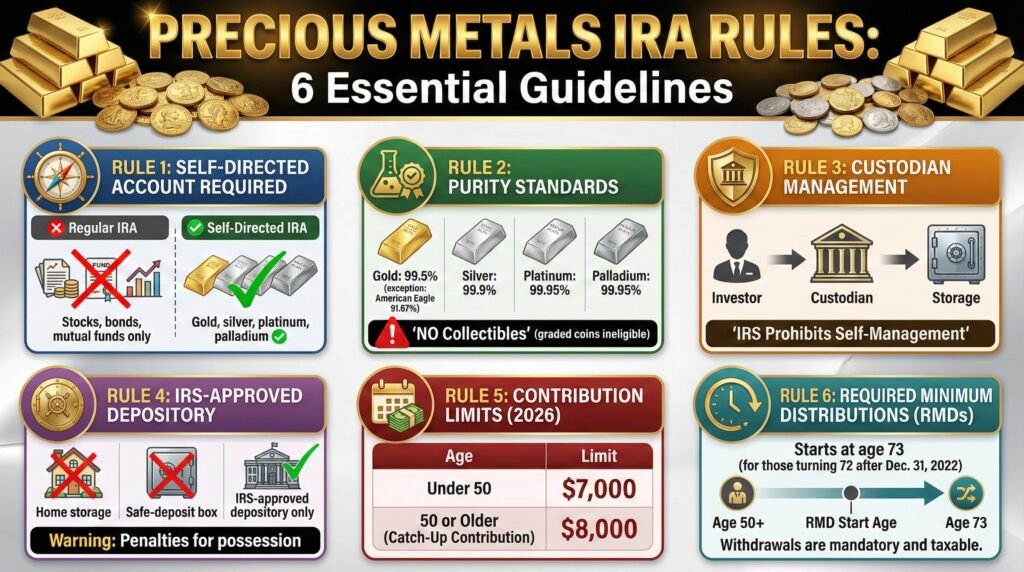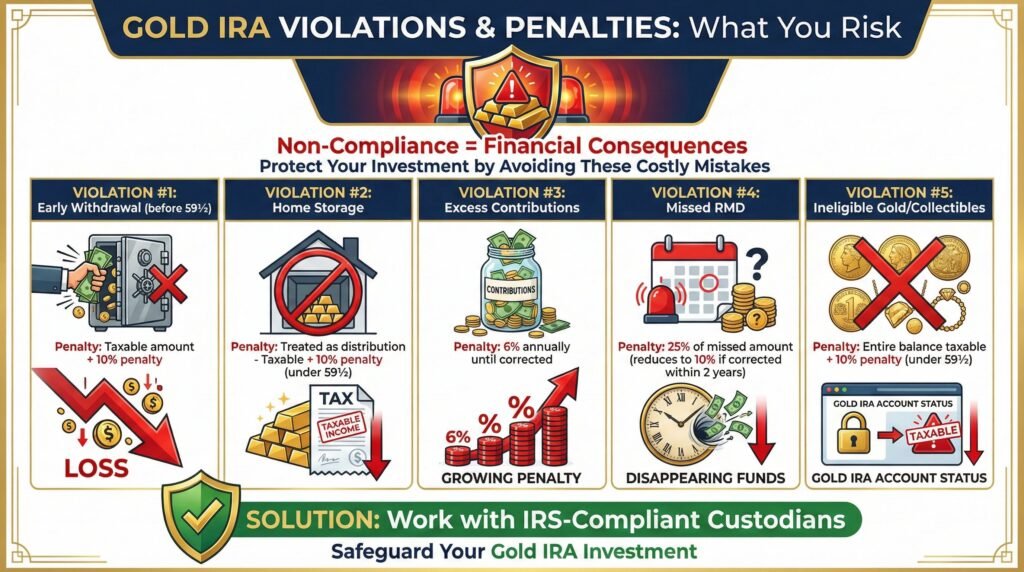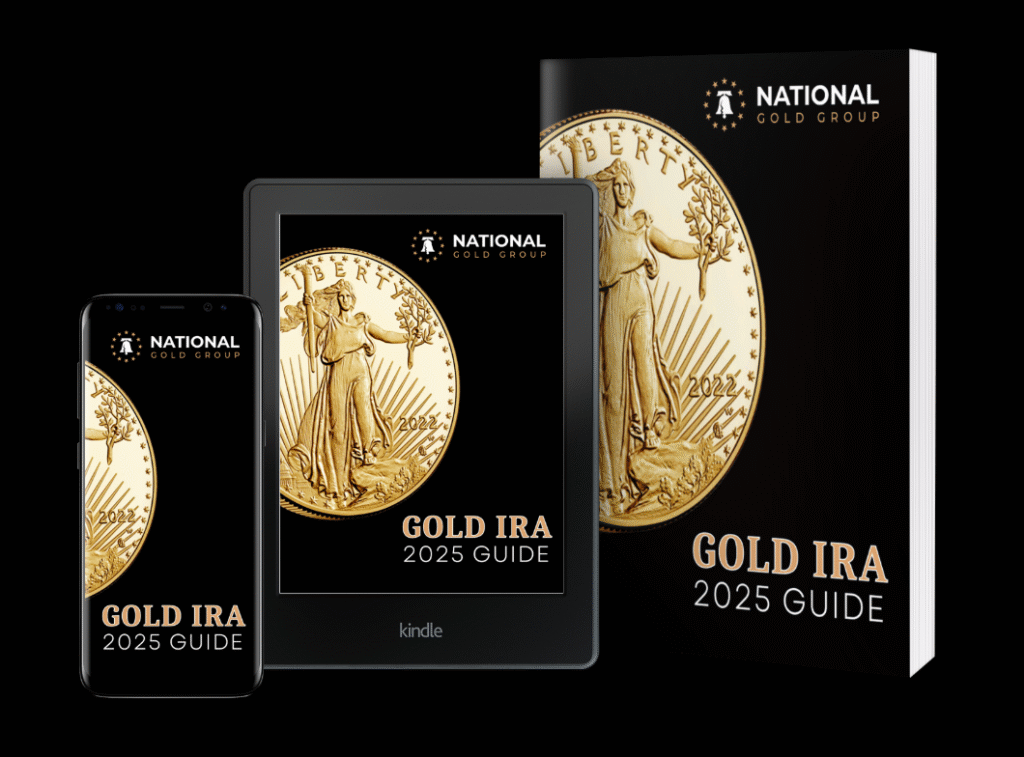Precious Metal IRA Rules

As you explore the option of a Precious Metal IRA, it’s vital to grasp the rules that govern it. Firstly, your investments must be stored at an IRS-approved depository, ensuring compliance and maintaining your account’s tax-advantaged status.
You’re limited to metals of specific purities: gold must be at least 99.5% pure, except for American Eagle coins; silver requires a purity of 99.9%, and platinum and palladium need to be 99.95% pure. To gain the best understanding of the precious metals IRA rules, we will explore the following subjects:
-
- What Is a Gold IRA?
- Types of Gold IRAs
- Precious Metals IRA rules
- How Much Can You Put in a Gold IRA?
- What happens if you don’t follow gold IRA rules and regulations?
An approved custodian must manage your IRA, which simplifies setting up and maintaining the account but involves considering their fees and the storage costs of the metals.
Furthermore, adhering to annual contribution limits is essential to avoid penalties, with the 2026 cap set at $7,500 for those under 50 and $8,500 for those over.
By understanding these guidelines, you’ll be better positioned to leverage this investment to secure and diversify your retirement portfolio, paving the way for greater insights into how to effectively navigate the complexities of precious metal investing.

What Is a Gold IRA?
A Gold IRA is a specialized individual retirement account designed to let you invest in physical gold and other precious metals, offering a unique way to diversify your retirement portfolio.
Unlike traditional retirement accounts, a Gold IRA must be held separately, requiring you to open this type of account through a broker-dealer or other custodian specifically approved to handle such investments.
This means you’re not just limited to physical assets like bullion or coins; you can also include precious metals-related securities within your portfolio, broadening your investment horizon.
Understanding the nuances of a Gold IRA reveals its tax-advantaged status, similar to conventional retirement accounts. However, the need for a specialized custodian, such as a bank or brokerage firm, underscores its distinct nature.
These self-directed IRA accounts empower you to purchase approved precious metals, along with gold-related paper investments, under the umbrella of a single retirement strategy.
When setting up a Gold IRA, it’s crucial to recognize that traditional custodians used for standard retirement accounts won’t suffice. You’ll need a specialty firm adept at navigating the specific documentation and reporting requirements for tax purposes inherent to these accounts.
Despite these complexities, contribution limits and distribution regulations mirror those of traditional IRAs. Notably, the IRS mandates that physical gold must be stored at an approved facility, emphasizing the secure and regulated nature of these investments.
In essence, a Gold IRA not only provides a hedge against inflation but also enriches your retirement planning with a layer of portfolio diversification, without straying from the familiar rules governing retirement savings.
Types of Gold IRAs
You have several options when considering a Gold IRA, each with its unique tax implications and investment strategies. You can choose between Traditional, Roth, and SEP Gold IRAs, tailored to fit different financial goals and situations.
Understanding these types will help you make an informed decision that aligns with your retirement planning objectives.
Traditional Gold IRAs
Why consider Traditional Gold IRAs as a cornerstone for your retirement savings strategy? These accounts offer a blend of security and tax efficiency that’s hard to match.
Funded with pretax dollars, you’re essentially reducing your current tax liability, allowing more of your money to work for you until retirement.
-
- Contributions and any earnings grow tax-deferred, meaning you won’t pay taxes on gains until you make withdrawals.
- At retirement, you’ll be taxed on withdrawals, potentially at a lower tax rate, depending on your income at that time.
- This setup provides a strategic way to balance your retirement portfolio with a tangible asset like gold, known for its stability and as a hedge against inflation.
Understanding these aspects helps in making informed decisions about diversifying and protecting your retirement savings.
Roth Gold IRAs
Understanding Traditional Gold IRAs sets the stage for exploring Roth Gold IRAs, which offer a distinct approach to funding your retirement with after-tax dollars. Unlike their traditional counterparts, Roth Gold IRAs don’t provide an immediate tax break.
Contributions are made with money you’ve already paid taxes on. This means you’re not getting a deduction upfront, but there’s a significant advantage waiting for you down the line. When retirement rolls around, and you start taking distributions, they’re completely tax-free.
This characteristic makes Roth Gold IRAs an attractive option for those who anticipate being in a higher tax bracket in the future or who prefer the certainty of knowing that their retirement withdrawals won’t be subject to taxes.
SEP Gold IRAs
SEP Gold IRAs offer a flexible retirement savings option for self-employed individuals and small business employees, allowing contributions of up to 25% of compensation or $66,000 for 2023. This unique IRA setup not only aids in building a robust retirement fund but also permits investing in precious metals, a feature not commonly found in traditional retirement accounts.
-
- Tax Advantages: You’re taxed only upon withdrawal, offering a tax-efficient saving strategy.
- Contribution Flexibility: The ability to contribute up to 25% of your income or $66,000 allows for significant annual savings.
- Investment in Precious Metals: Diversify your portfolio by including gold, which can act as a hedge against inflation and economic downturns.
Understanding these key points ensures you’re well-informed about the benefits and regulations surrounding SEP Gold IRAs.
Finding the Best Gold IRA Company for Your Retirement Goals
When weighing the advantages and disadvantages of precious metals IRAs, a long-established and trusted gold IRA company that knows the rules and legal implications is key.
Also, a dedicated gold IRA company can provide competitive prices, transparency, reliable customer service, and security of your precious metals.
Depending on whether you are a high-net investor looking for the most competitive prices or require a lower investment minimum and affordable entry to the gold market, we have researched and reviewed our best 4 gold IRA and precious metal investment companies that meet those individual needs. Whether you prefer a gold IRA or owning the physical gold in your place of residence.
Click the banner below to visit National Gold Group’s official site to receive their free gold IRA guide:
Precious Metals IRA rules
Navigating the terrain of precious metals IRAs requires understanding specific regulations. You must ensure your gold IRA is self-directed, the metals meet defined purity standards, and a custodian oversees the account’s management.
Additionally, storing your gold in an IRS-approved depository and adhering to annual contribution limits are crucial steps to maintain compliance and maximize benefits.
Gold IRAs must be self-directed
Why must anyone looking to include gold in their IRA opt for a self-directed account? The answer lies in the flexibility and range of investment options that a self-directed IRA offers.
Unlike regular IRAs, which limit investments to stocks, bonds, and similar assets, a self-directed IRA allows for the inclusion of gold and other precious metals. This is critical for diversifying your retirement portfolio with tangible assets.
-
- Contributions to a self-directed IRA are tax-deductible, offering significant tax advantages.
- You’re not limited to traditional assets; besides gold, you can invest in real estate, silver, platinum, and palladium.
- Regular IRAs simply don’t provide the option to invest in precious metals, making a self-directed IRA necessary for this purpose.
Precious metals must meet certain standards
To include gold in your IRA, it’s crucial to understand that not all precious metals qualify; they must meet specific purity and production standards set by the IRS. Your gold IRA provider should guide you on eligible coins, bars, and bullion.
Generally, IRA-eligible gold must be 99.5% pure, except for American Eagle coins, which are an exception at 91.67% pure yet still qualify. Silver must be 99.9% pure, while platinum and palladium require a 99.95% purity.
These metals must originate from a national government mint or an accredited manufacturer. However, if your gold is considered a “collectible” by being graded by a certified organization, it loses its eligibility.
This stipulation prevents the investment from being taxed as a collectible, safeguarding your IRA’s tax-advantaged status.
IRAs must be managed by a custodian
You must enlist a custodian to manage your precious metals IRA, as the IRS does not allow investors to personally add gold or other eligible metals to their IRAs.
A custodian, often a financial institution, is indispensable for setting up a self-directed IRA, managing fund transfers to precious metals dealers, and overseeing the transport and storage of your physical assets.
Opting for a custodian isn’t just a regulatory formality; it’s a crucial step in safeguarding your investment.
-
- Selection Criteria: Before choosing a custodian, verify their IRS approval, inquire about storage and management fees, and research their business tenure and customer feedback.
- Funding Methods: You can fund your IRA with cash deposits, asset transfers from another IRA, or rollovers from a different retirement account.
- Comprehensive Service: Most gold IRA companies have strong ties with reputable custodians, simplifying the entire process for you.
Store your gold in an IRS-approved depository
Selecting an IRS-approved depository for the storage of your gold and precious metals is a critical compliance step in maintaining a precious metals IRA. The IRS strictly prohibits you from keeping these assets at home or in a safe-deposit box.
If you mistakenly take possession, even briefly, you could face severe penalties and taxes, as the IRS may view it as a distribution. Your custodian will assist in transferring your metals to a secure facility, ensuring adherence to IRS rules.
When choosing a depository, consider its security measures, insurance policies, and the annual storage fees. Remember, the depository safeguards your investments until you decide to sell or take a distribution, at which point your gold is securely delivered to you.
Don’t contribute more than you’re able to
After ensuring your precious metals are stored correctly, it’s equally important to adhere to the annual contribution limits set by the IRS for your precious metals IRA.
For 2026, the IRS caps contributions at $7,500 for individuals younger than 50 and $8,500 for those 50 and older. These limits are set annually. Exceeding these amounts can result in a tax penalty.
-
- Stay Informed: Keep up-to-date with IRS changes to avoid unintended penalties.
- Plan Your Contributions: Strategically plan contributions to maximize your retirement savings without overstepping legal boundaries.
- Understand Rollovers: Rolling over or transferring from another retirement fund isn’t bound by these contribution limits, but know the difference to maintain compliance.
Adhering to these guidelines ensures your precious metals IRA remains a valuable part of your retirement portfolio.
Hold the gold in your IRA until you are 59½
Holding your gold and other precious metals in a gold IRA until reaching the age of 59½ is a fundamental rule, designed to optimize the tax benefits available to you. These accounts are structured for retirement savings, offering tax advantages that necessitate adherence to specific withdrawal timelines.
The IRS mandates that you can’t access your gold IRA assets before 59½ without facing potential financial penalties. Upon reaching this age, you’re allowed to withdraw, paying any due income taxes, and may choose to liquidate or take physical possession of the metals without penalty.
This flexibility to hold, sell, or pass on your precious metals underscores the gold IRA’s value. However, premature withdrawals come with a 10% penalty and possibly a 28% capital gains tax, though exceptions exist for specific situations.
Best Gold IRA for Minimum Investment. Click the banner below to visit American Hartford Gold’s official site to get started.
How Much Can You Put in a Gold IRA?
In 2026, you can contribute up to $7,500 to a gold IRA for those under 50 and upto $8,500 for those over 50, reflecting the limits for both traditional and Roth IRAs.
Investing in a gold IRA allows for diversification of your retirement portfolio, a crucial factor in mitigating risk. However, understanding the contribution limits is essential for maximizing the benefits while adhering to IRS regulations.
Here are three critical points to remember about contributing to your gold IRA:
- Catch-up Contributions: If you’re 50 or older, don’t forget about the extra $1,000 you can contribute. This opportunity accelerates your retirement savings, especially beneficial if you’re getting a late start.
- Annual Increases: Be aware of the potential for annual increases in contribution limits. The IRS adjusts these limits to account for inflation, which can enhance your ability to save over time.
- Limits Apply Across IRAs: The contribution limit is cumulative across all your IRA accounts, including traditional, Roth, and gold IRAs. It’s vital to plan your contributions to ensure you don’t exceed the total allowed limit across all accounts.
Understanding these rules and planning accordingly can significantly affect your retirement savings. By analyzing and adjusting your contributions each year, you ensure that you’re optimizing your investment while staying within the legal boundaries set by the IRS.
What Happens if You Don’t Follow Gold IRA Rules and Regulations?

Understanding the contribution limits and advantages of a gold IRA sets the stage for a deeper examination of the consequences that arise when you don’t adhere to its rules and regulations.
Non-compliance can lead to significant financial repercussions, impacting the tax benefits and overall value of your investment.
Before embarking on the gold IRA investment path, you must review the gold IRA withdrawal rules. If you make early withdrawals, you’re hit with a double whammy: the withdrawn amount becomes taxable, and you’re typically saddled with a 10% penalty. T
his rule underscores the importance of viewing your gold IRA as a long-term investment rather than an easy-access fund.
Opting for home storage of your gold seems convenient, but it is a serious misstep. Such an action is treated as a distribution, making it taxable. If you’re under 59½, the additional 10% penalty further dents your finances.
Exceeding the contribution limit is another pitfall, attracting a 6% penalty on the excess amount. This penalty persists annually until the excess is corrected, underscoring the need for vigilance in contribution calculations.
Neglecting to take a required minimum distribution (RMD) after reaching the specified age triggers a harsh 25% penalty of the missed distribution, though this can be reduced to 10% if the oversight is corrected promptly within two years.
Incorporating collectible or ineligible gold into your IRA doesn’t just blur the lines of compliance; it jeopardizes the account’s tax-advantaged status. The entire balance could become taxable, with the under-59½ penalty clause applying here, too.
Navigating the complexities of a gold IRA requires diligence and often, the guidance of experienced custodians. They won’t offer investment advice but will ensure your account adheres to IRS mandates, safeguarding your investment from unintended penalties.
Access the Augusta Precious Metals gold IRA checklist by clicking the banner below, and make sure you are aware of all aspects of the gold IRA process:


Conclusion
In conclusion, navigating the intricate landscape of precious metal IRAs demands a vigilant understanding of its regulations. By choosing the right type and diligently adhering to investment caps, you safeguard your retirement savings.
However, straying from these rules can lead to penalties, eroding the value of your investments. It’s crucial to stay informed and compliant to maximize the benefits of your gold IRA, ensuring a secure and prosperous retirement. Always consult with a financial expert to guide your decisions.
As the price of gold and silver continues to rise, timing is key. Finding the right gold IRA company to lock in the best prices and ensure your retirement is secure is critical. Access the free gold investment guides and start your tax-deferred gold IRA via the buttons below.
If you have 100K in retirement savings to protect and are looking to take advantage of the best gold and silver prices, attend a free gold investment educational webinar hosted by Augusta Precious Metals via the button below.
Find the right company for you. Obtain a gold IRA guide and talk to a broker





Gold IRA FAQs

Adam ONeill
Author, lifelong investor, and creator of PreciousMetalsInvestmentPortfolio.com


